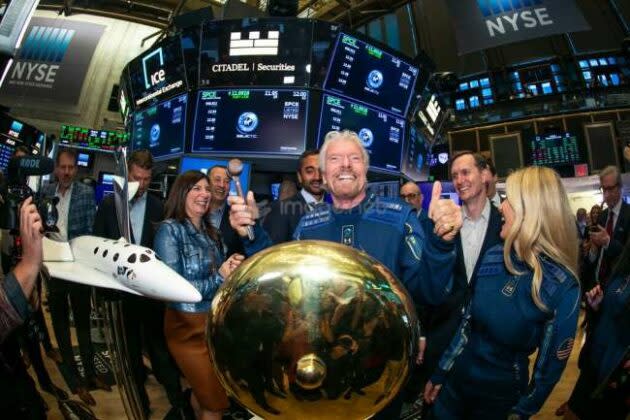Virgin Galactic soars and then levels off on first day as publicly traded space company

Like the rocket plane it operates, Virgin Galactic’s stock price blasted off on its first day as a publicly traded company, and then glided to a somewhat lower altitude.
The company, founded 15 years ago by British billionaire Richard Branson, now bills itself as the “world’s first and only publicly traded commercial human spaceflight company.” It went public today thanks to a merger with a special-purpose vehicle known as Social Capital Hedosophia, or SCH.
SCH took on a 49% share of the merged company, which is known as Virgin Galactic Holdings and traded on the New York Stock Exchange as SPCE. Branson and other shareholders in the pre-merger Virgin Galactic retained a controlling share of 51%. The company was valued at $1.5 billion at the time of the merger. SCH’s CEO, venture investor Chamath Palihapitiya, is investing another $100 million in the enterprise.
During today’s trading, share prices rose by as much as 9.7%, compared with the $11.79 value for final trading before the merger on Friday. By the end of today’s trading, the price settled down to $11.75, marking a smidgen of a loss for the day. Trading volume amounted to more than 12.5 million shares.
For what it’s worth, the value of SCH’s shares had been rising over the past few weeks in anticipation of the merger.
Since its founding as a privately held company, Virgin Galactic has been working on a launch system that includes its WhiteKnightTwo carrier airplane and the SpaceShipTwo rocket plane.
The first SpaceShipTwo, dubbed VSS Enterprise, broke up during a rocket-powered test flight in 2014, killing one test pilot and severely injuring the other. The second SpaceShipTwo, VSS Unity, has successfully passed the 50-mile space milestone twice during tests at California’s Mojave Air and Space Port.
Operations are now transitioning to Spaceport America in New Mexico, and the current schedule calls for commercial flights to the edge of space to begin in 2020. More than 600 “Future Astronauts” have made reservations at a cost of as much as $250,000 a seat. Branson says he’ll be on the first commercial flight.
Branson, who has big plans for point-to-point suborbital spaceflights using a worldwide network of spaceports, rang the NYSE’s opening bell and flashed a thumbs-up to kick off today’s trading.
Afterward, he hailed the market milestone on CNBC’s “Squawk on the Street.”
“If the public want to dabble a little bit in a spaceship company, own a little bit of a spaceship company, they can now do so,” he said.
Virgin Galactic CEO George T. Whitesides was more businesslike about the value proposition in a prepared statement.
“For the first time, anyone will have the opportunity to invest in a human spaceflight company that is transforming the market,” Whitesides said. “Virgin Galactic has been working tirelessly to turn the concept of human spaceflight into reality, and our IP and engineering skills alongside the talent we have in our business makes us confident and excited about our future.”
Virgin Galactic’s main competitor in the suborbital human spaceflight market is Blue Origin, the privately held space venture founded by Amazon CEO Jeff Bezos. Blue Origin has been conducting uncrewed flight tests of its New Shepard suborbital spacecraft for the past four years. The company hasn’t yet set a ticket price, and it’s not yet taking reservations, but Bezos and other executives say New Shepard will start flying people next year.
In recent years, Virgin Galactic spun off The Spaceship Company, which builds the WhiteKnightTwo and SpaceShipTwo planes; and Virgin Orbit, which is working on an air-launch system to put spacecraft in orbit. The Spaceship Company is part of Virgin Galactic’s go-public plan, but Virgin Orbit isn’t.
Other major players in the long-term human spaceflight market include publicly traded Boeing and privately held SpaceX, which are building space taxis for NASA’s use and plan to take on private customers as well. This month, Boeing’s venture capital arm committed to investing $20 million in Virgin Galactic Holdings.
More from GeekWire:
Boeing to invest $20M in Virgin Galactic, marking a milestone team-up in commercial space
Virgin Galactic’s Richard Branson talks up spacesuits and his countdown to space trip
Virgin Galactic’s pilots get first commercial astronaut wings awarded in 15 years
SpaceShipTwo rocket plane pushes the envelope in third supersonic test flight
